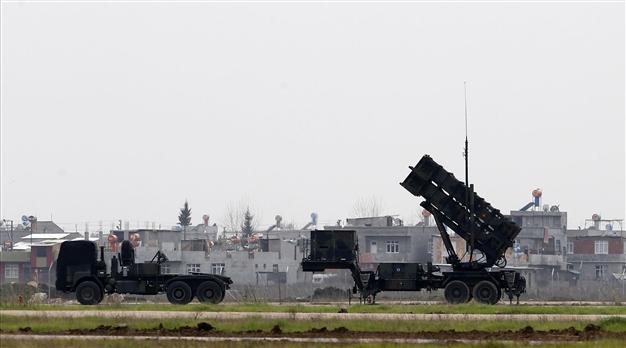NATO’s Patriots fail to stop Syrian missile hitting Turkey
Uğur Ergan ANKARA

DAILY NEWS Photo
Questions are being raised after Patriot batteries placed in three Turkish provinces by NATO failed to prevent a Syrian missile from hitting Turkey.The Turkish General Staff said in a March 25 statement that “a rocket or missile” fired by the Syrian army during its engagement with rebels crossed the border late on March 24 and exploded near the Cüdeyde neighborhood of the Reyhanlı district in the southern Turkish province of Hatay.
The projectile left a 15-meter-wide crater in a stream bed, broke the windows of the surrounding houses, caused the roof of a building in the nearby military unit to collapse, damaged two military vehicles and inflicted minor injuries on five Turkish civilians.
Two Turkish howitzers pounded a Syrian artillery unit near the border in retaliation on March 25.
‘Scud launched from Tartus’
Sources told Hürriyet that what hit the Turkish territory was a missile launched from the Syrian city of Tartus, which hosts a Russian naval base, some 200 kilometers from the Turkish border.
“The missile fell in an area that was outside the radar range of Patriot batteries in Turkey,” a source added.
Erdoğan Karakuş, a retired lieutenant-general from the Turkish Air Force, also told Hürriyet that the Syrian missile which hit Turkey was “most likely a Scud missile.”
Scuds are a series of tactical ballistic missiles developed by the Soviet Union during the Cold War. Syria began its Scud program in the 1970s and started to produce its own missiles in 1993 with the help of Russia.
A diplomatic crisis occurred when a Syrian missile fell near a village in Hatay in May 2005 during a military test, prompting the Turkish authorities to react at a time of warm relations between the two countries.
Citing the Syrian army’s missile usage since the start of the civil war, which has severed ties between Ankara and Damascus, Karakuş also criticized NATO over the incident.
Position of batteries ‘wrong’
“The latest crisis shows that a Patriot missile battery should have been placed in Hatay. Of course Patriots can’t catch everything in the air, but the current positions of the batteries in Turkey can only defend certain interests,” he said.
Claiming NATO’s main purpose was to protect the U.S. airbase in Adana (İncirlik) and the NATO radar in Malatya (Kürecik), Karakuş said Hatay was actually the “riskiest area,” and thus the most important spot for a Patriot battery to be placed in order to protect Turkish citizens.
When the threat posed by the Syrian army, then armed with chemical weapons, worsened in December 2012, Ankara asked its NATO allies to shield 10 Turkish provinces with an integrated Patriot missile system.
Germany, the Netherlands and the United States currently provide two Patriot batteries each, located in the provinces of Kahramanmaraş, Adana and Gaziantep
















